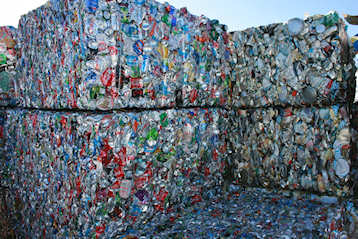 OAKLAND, Calif. – In the past few months, intense demand and high prices for recycled materials have disappeared, giving way to stockpiles of unwanted materials and halved rates.
OAKLAND, Calif. – In the past few months, intense demand and high prices for recycled materials have disappeared, giving way to stockpiles of unwanted materials and halved rates.
Leading up to the Beijing Olympics, during which numerous Chinese factories and plants were shut down, Chinese companies intensified their imports of paper, plastic and other materials to recycle into new products. Since then, demand has fallen drastically, with the drop attributed to a number of factors.
Consumers are buying fewer products made in China, and with fewer products being shipped overseas, there is a lesser need for boxes and packaging materials to move those items, according to The Journal of Commerce. Chinese producers, therefore, need fewer materials to make packaging and items.
"A lot of the material was going to China to make boxes for all the things they were shipping back to the United States," Bruce Savage, spokesman for the Institute of Scrap Recycling Industries in Washington, told the Sacramento Bee. "When they aren't producing products, they don't need the packaging materials."
Some importers are now refusing to claim shipments of recyclables, The Journal reports, and others are negotiating lower prices for shipments that are already at sea, effectively forcing exporters to accept a price cut.
Scrap dealers and recycling firms across the U.S. are seeing the effects of lower demand, from companies in California stockpiling collected materials, refusing drop-offs from the public or charging customers for picking up materials, to New England communities that have seen rebates for paper and cardboard drop from more than $100 a ton to as low as $30 and $40 a ton.
Recycling in the U.K. is being hurt just as well. Of the 8.6 million tonnes of paper collected in the U.K. annually, only 4 million tonnes is handled within the country. The rest is exported, with about 75 percent going to China and other Far East countries, according to the Confederation of Paper Industries.
As demand from the Far East has slowed, firms are either warehousing the 400,000 tonnes of paper recovered monthly or selling it at a loss. "Even if Far East buyers return to the market quickly it is very doubtful that prices for the material will be anywhere near where they were through the middle of 2008 and excess stored material is likely to suppress prices for a much longer period," the Confederation said in a statement.